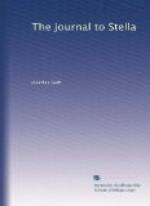4 Henry Davenant, son of Charles Davenant (see Letter 8, note 14), was Resident at Frankfort. Macky described him as “very giddy-headed, with some wit,” to which Swift added, “He is not worth mentioning.”
5 Thomas Burnet, youngest son of Gilbert Burnet, Bishop of Salisbury, was at this time a young man about town of no good reputation. Afterwards he turned his attention to the law, and was appointed a judge of the Court of Common Pleas in 1741. He was knighted in 1745, and died in 1753.
6 By Arbuthnot, written to recommend the peace proposals of the Government. The full title was, Law is a Bottomless Pit. Exemplified in the case of the Lord Strutt, John Bull, Nicholas Frog, and Lewis Baboon; who spent all they had in a Law Suit.
7 See Letter 25, note 6 and Letter 41, note 35.
8 Our little language.
9 Forster reads, “two deelest nauty nown MD.”
10 See Letter 6, note 12.
11 William Diaper, son of Joseph Diaper of Bridgewater, was sent to Balliol College, Oxford, in 1699, at the age of fourteen. He entered the Church, and was curate at Brent, Somerset; but he died in 1717, aged twenty-nine.
12 The Examiner (vol. ii. No. 15) complained of general bribery and oppression on the part of officials and underlings in the public service, especially in matters connected with the army; but the writer said that the head (Lord Lansdowne) was just and liberal in his nature, and easy in his fortune, and a man of honour and virtue.
13 Sealed documents given to show that a merchant’s goods are entered.
14 Thomas Lawrence, First Physician to Queen Anne, and Physician-General to the Army, died in 1714 (Gentleman’s Magazine, 1815, ii. 17). His daughter Elizabeth was second wife to Lord Mohun.
15 See Letter 17, note 11.
16 See Letter 26, note 2.
17 No officer named Newcomb appears in Dalton’s Army Lists; but the allusion to General Ross, further on in Letter 43, adds to the probability that Swift was referring to one of the sons of Sir Thomas Newcomen, Bart., who was killed at the siege of Enniskillen. Beverley Newcomen (Dalton, iii. 52, iv. 60), who was probably Swift’s acquaintance, was described in a petition of 1706 as a Lieutenant who had served at Killiecrankie, and had been in Major-General Ross’s regiment ever since 1695.




